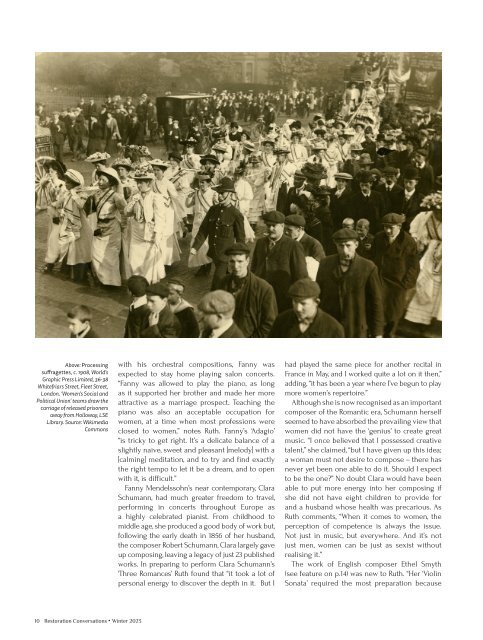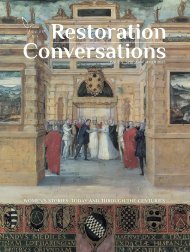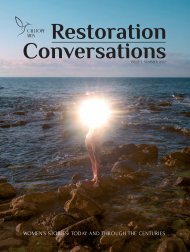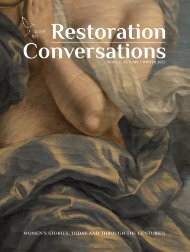Winter 2023
Restoration Conversations is a digital magazine spotlighting the achievements of women in history and today. We produce two issues a year: Spring/Summer and Fall/Winter
Restoration Conversations is a digital magazine spotlighting the achievements of women in history and today. We produce two issues a year: Spring/Summer and Fall/Winter
You also want an ePaper? Increase the reach of your titles
YUMPU automatically turns print PDFs into web optimized ePapers that Google loves.
Above: Processing<br />
suffragettes, c. 1908, World’s<br />
Graphic Press Limited, 36-38<br />
Whitefriars Street, Fleet Street,<br />
London. ‘Women’s Social and<br />
Political Union’ teams draw the<br />
carriage of released prisoners<br />
away from Holloway, LSE<br />
Library. Source: Wikimedia<br />
Commons<br />
with his orchestral compositions, Fanny was<br />
expected to stay home playing salon concerts.<br />
“Fanny was allowed to play the piano, as long<br />
as it supported her brother and made her more<br />
attractive as a marriage prospect. Teaching the<br />
piano was also an acceptable occupation for<br />
women, at a time when most professions were<br />
closed to women,” notes Ruth. Fanny’s ‘Adagio’<br />
“is tricky to get right. It’s a delicate balance of a<br />
slightly naïve, sweet and pleasant [melody] with a<br />
[calming] meditation, and to try and find exactly<br />
the right tempo to let it be a dream, and to open<br />
with it, is difficult.”<br />
Fanny Mendelssohn’s near contemporary, Clara<br />
Schumann, had much greater freedom to travel,<br />
performing in concerts throughout Europe as<br />
a highly celebrated pianist. From childhood to<br />
middle age, she produced a good body of work but,<br />
following the early death in 1856 of her husband,<br />
the composer Robert Schumann, Clara largely gave<br />
up composing, leaving a legacy of just 23 published<br />
works. In preparing to perform Clara Schumann’s<br />
‘Three Romances’ Ruth found that “it took a lot of<br />
personal energy to discover the depth in it. But I<br />
had played the same piece for another recital in<br />
France in May, and I worked quite a lot on it then,”<br />
adding, “it has been a year where I’ve begun to play<br />
more women’s repertoire.”<br />
Although she is now recognised as an important<br />
composer of the Romantic era, Schumann herself<br />
seemed to have absorbed the prevailing view that<br />
women did not have the ‘genius’ to create great<br />
music. “I once believed that I possessed creative<br />
talent,” she claimed, “but I have given up this idea;<br />
a woman must not desire to compose – there has<br />
never yet been one able to do it. Should I expect<br />
to be the one?” No doubt Clara would have been<br />
able to put more energy into her composing if<br />
she did not have eight children to provide for<br />
and a husband whose health was precarious. As<br />
Ruth comments, “When it comes to women, the<br />
perception of competence is always the issue.<br />
Not just in music, but everywhere. And it’s not<br />
just men, women can be just as sexist without<br />
realising it.”<br />
The work of English composer Ethel Smyth<br />
(see feature on p.14) was new to Ruth. “Her ‘Violin<br />
Sonata’ required the most preparation because<br />
10 Restoration Conversations • <strong>Winter</strong> <strong>2023</strong>





